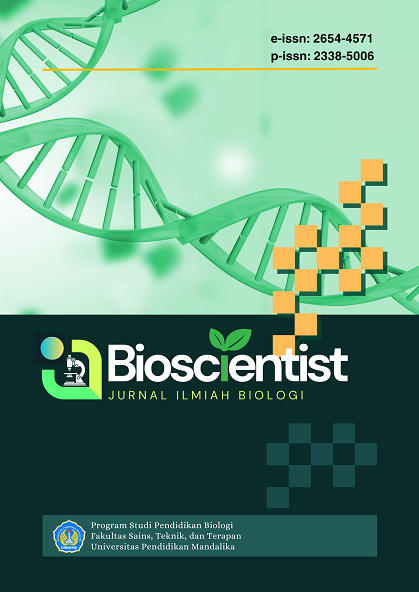Analisis Filogenetik Lebah Madu Endemik Sulawesi Apis nigrocincta Smith, 1860 Berdasarkan Gen 16S rRNA
DOI:
https://doi.org/10.33394/bioscientist.v13i1.14968Keywords:
Apis nigrocincta, filogenetik, 16S rRNAAbstract
Apis nigrocincta is an endemic honey bee that is only found in two regions in Indonesia, namely the Sangihe Islands and Sulawesi Islands. Phylogenetic analysis is used to describe the phylogenetic relationship of Sulawesi endemic honey bee A. nigrocincta based on the 16S rRNA gene. Sampling using the cruising method in various regions, then DNA isolation, DNA amplification, sequencing, and continued bioinformatics analysis using GeneStudio, DNASTAR, MESQUITE, and MEGA 11. The results showed that phylogenetic analysis with the Neighbor-Joining (NJ) and Maximum Likelihood (ML) methods produced a phylogenetic tree that illustrates clear evolutionary relationships. A. nigrocincta from Central Sulawesi is more closely related to other A. nigrocincta species in the same clade, while other species are separated. The results of this study show a clear pattern of kinship between A. nigrocincta populations.
Â
References
Church, D.L., Cerutti, L., Gürtler, A., Griener, T., Zelazny, A., & Emler, S. (2020). Performance and Application of 16S rRNA Gene Cycle Sequencing for Routine Identification of Bacteria in the Clinical Microbiology Laboratory. American Society for Microbiology, 33(4): 1–74. https://journals.asm.org/doi/full/10.1128/cmr.00053-19
Elyasigorji, Z., Izadpanah, M., Hadi, F., & Zare, M. (2023). Mitochondrial Genes as Strong Molecular Markers for Species Identification. The Nucleus, 66(1): 81-93. https://link.springer.com/article/10.1007/s13237-022-00393-4
Harianja, A.H., Adalina, Y., Pasaribu, G., Winarni, I., Maharani, R., Fernandes, A., Saragih, G.S., Fauzi, R., Tampubolon, A.P., Njurumana, G.N., Sukito, A., Aswandi, A., Kholibrina, C.R., Siswadi, S., Kurniawan, H., Hidayat, M.Y., Wahyuni, R., Koeslulat, E.E., Heryanto, R.B., Basuki, T., Silva, H.D., Ngongo, Y., Rosari, B.D., Waluyo, T.K., Turjaman, M., Prabawa, S.B., & Kuspradini, H. (2023). Potential of Beekeeping to Support The Livelihood, Economy, Society, and Environment of Indonesia. Forests, 14(2): 1–37. https://doi.org/10.3390/f14020321
Jayadi, L.Z., & Susandarini, R. (2020). Melissopalynological Analysis of Honey Produced by Two Species of Stingless Bees in Lombok Island, Indonesia. Nusantara Bioscience, 12(2): 97–108. https://doi.org/10.13057/nusbiosci/N120203
Kusumah, Y.M., Kurniawati, F., Kristanto, E.D., Parasian, F., & Christian, M. (2023). Analisis Filogenetik Hyposidra talaca nucleopolyhedrovirus (HytaNPV) yang Diisolasi dari Perkebunan Teh Gunung Mas, Bogor, Jawa Barat dan Virulensinya Terhadap Hyposidra talaca Walker. Jurnal Entomologi Indonesia, 20(2): 151–160. https://doi.org/10.5994/jei.20.2.151
Lombogia, C.A., Tulung, M., Posangi, J., & Tallei, T.E. (2020). Bacterial Composition, Community Structure, and Diversity in Apis nigrocincta Gut. International Journal of Microbiology, 2020: 1-8. https://doi.org/10.1155/2020/6906921
Mandal, S.D., Chhakchhuak, L., Gurusubramanian, G., & Kumar, N.S. (2014). Mitochondrial Markers for Identification and Phylogenetic Studies in Insects – A Review. DNA Barcodes, 2(1): 1–9. https://doi.org/10.2478/dna-2014-0001
Nuraini, N., & Purwanto, H. (2021). Morphology, Morphometrics, and Molecular Characteristics of Apis cerana and Apis nigrocincta from Central Sulawesi, Indonesia. Jurnal Biologi Tropis, 21(2): 368–382. https://doi.org/10.29303/jbt.V21i2.2614
Oktafia, R.E., & Badruzsaufari. (2021). Analisis Filogenetik Garcinia Spp. Berdasarkan Sekuens Gen rRNA. Ziraa’ah Majalah Ilmiah Pertanian, 46(2): 259-264. https://doi.org/10.31602/zmip.v46i2.4526
Raffiudin, R., Ariyanti, N.S., Aprilianingrum, I., Anwar, H., Shullia, N.I., Bening, S., Wiyati, S.Y., Priawandiputra, W., Saleh, S., Suardi., Fahri, F., Putra, R.E., Soesilohadi, R.C.H., & Purnobasuki, H. (2022). Flight Activity and Pollen Resources of Apis nigrocincta and Apis cerana in Central Sulawesi, Indonesia. Agriculture and Natural Resources, 56: 463-472. https://li01.tci-thaijo.org/index.php/anres/article/view/254978
Raffiudin, R., & Crozier, R.H. (2007). Phylogenetic Analysis Of Honey Bee Behavioral Evolution. Molecular Phylogenetics And Evolution, 43: 543-552. https://doi.org/10.1051/apido
Sahadeva, M.L., Pertiwi, N.P.D. (2023). Konstruksi Pohon Filogenetik Spesies dalam Famili Orchidaceae Berdasarkan Marka Gen matK Kloroplas: Studi in Silico. Jurnal Matematika, Sains, dan Pembelajarannya, 17(3): 12-27. https://ejournal.undiksha.ac.id/index.php/jpm/article/view/87986
Saleky, D., & Dailami, M. (2021). Konservasi Genetik Ikan Kakap Putih (Lates calcarifer, Bloch, 1790) melalui Pendekatan DNA Barcoding dan Analisis Filogenetik di Sungai Kumbe Merauke Papua. Jurnal Kelautan Tropis, 24(2): 141–150. https://doi.org/10.14710/jkt.v24i2.10760
Shakya, M., Ahmed, S.A., Davenport, K.W., Flynn, M.C., Lo, C.C., & Chain, P.S.G. (2020). Standardized Phylogenetic and Molecular Evolutionary Analysis Applied to Species Across The Microbial Tree of Life. Scientific Reports, 10(1): 1–15. https://doi.org/10.1038/s41598-020-58356-1
Subari, A., Razak, A., & Sumarmin, R. (2021). Phylogenetic Analysis of Rasbora Spp. Based on The Mitochondrial DNA CO1 Gene in Harapan Forest. Jurnal Biologi Tropis, 21(1): 89–94. https://doi.org/10.29303/jbt.v21i1.2351
Trianto, M., & Purwanto, H. (2020). Morphological characteristics and morphometrics of stingless bees (Hymenoptera: Meliponini) in Yogyakarta, Indonesia. Biodiversitas, 21(6): 2619–2628. https://doi.org/10.13057/biodiv/d210633
Wallace, D.C. (2018). Mitochondrial Genetic Medicine. Nature Genetics, 50(12): 1642–1649. https://doi.org/10.1038/s41588-018-0264-z
Wanigatunge, R.P., Arachchi, D.N.M., Chandrasekharan, N.V., & Kulasooriya, S.A. (2014). Genetic Diversity and Molecular Phylogeny of Cyanobacteria from Sri Lanka Based on 16S rRNA Gene. Environmental Engineering Research, 19(4): 317–329. https://doi.org/10.4491/eer.2014.035
Zhang, H., & Bu, W. (2022). Exploring Large-Scale Patterns of Genetic Variation in The COI Gene Among Insecta: Implications for DNA Barcoding and Threshold-Based Species Delimitation Studies. Insects, 13(5): 1-11. https://doi.org/10.3390/insects13050425













